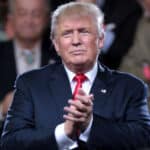



Donald Trump’s legal troubles have intensified as he faces appeals for both, a 34-count felony conviction and a $355 million civil fraud judgment.
Slate reported that the former president’s legal team is challenging his New York hush money case conviction and civil fraud judgment amidst various legal hurdles.
Trump was convicted of 34 felony counts in relation to a hush money payment case in New York. His legal team has appealed the conviction, citing a recent Supreme Court decision. The decision pertains to presidential immunity from prosecution for "official acts."
Manhattan District Attorney Alvin Bragg submitted documents asserting that the SCOTUS ruling should not affect Trump’s conviction. Bragg argues that Trump’s actions were personal and did not qualify for presidential immunity.
The charges against Trump are supported by evidence presented at trial, including four tweets about Michael Cohen and Stormy Daniels. Testimonies also came from Hope Hicks, who discussed conversations with Trump about the Access Hollywood tape and the hush money payment to Daniels.
Bragg’s memo emphasized that the SCOTUS decision “has no bearing on this prosecution and would not support vacatur of the jury’s unanimous verdict.”
Bragg explained that Trump’s actions were "purely personal conduct" and not part of his official presidential duties. According to Bragg, the SCOTUS decision always excluded public statements made in an unofficial capacity.
Hope Hicks’s conversations with Trump were also considered admissible since she is not a formal government appointee. A district court judge noted that the evidence “overwhelmingly suggests” the hush money payment was personal, aimed at covering up an embarrassing event.
Trump’s lead defense attorney, Todd Blanche, has requested time to respond to Bragg’s memo. New York Supreme Court Justice Juan Merchan is expected to rule on the question of immunity by September 6. If the conviction is upheld, Trump’s sentencing is slated for September 18.
In parallel, Trump’s legal team is also appealing a civil fraud judgment that totals $355 million. The judgment followed allegations that Trump exaggerated property values. The appeal was filed after other legal confrontations faced delays.
Testimonies from Michael Cohen and Trump’s children, Don Jr., Eric, and Ivanka, were instrumental in the civil fraud trial. Judge Engoron’s ruling criticized the family’s conduct, noting a "complete lack of contrition and remorse [that] borders on pathological."
After failing to secure a full bond, Trump was required to post a bond of $175 million to prevent asset seizure.
New York Attorney General Letitia James is set to address Trump’s appeal next month, with oral arguments scheduled for the fall.
Trump’s legal ordeal is complex and multifaceted, involving multiple appeals and ongoing battles.
The Supreme Court’s recent decision may influence the outcome, but DA Bragg remains firm that it does not apply to Trump’s case. Since Trump’s actions were “wholly unofficial,” Bragg believes they fall outside the scope of presidential immunity.
The hush money case’s evidence includes Twitter posts and testimonies suggesting personal motives. Hope Hicks’s admissions concerning Trump’s knowledge of the hush payment have been considered pivotal. Bragg maintains that this behavior does not receive immunity under SCOTUS guidelines.
As of now, Trump’s legal team continues its efforts to overturn both the felony conviction and the civil fraud judgment.
Judge Merchan’s decision and upcoming hearings may steer the course of Trump’s legal trajectory. Similarly, the fall hearing for the civil fraud case could impact Trump's financial liabilities and broader legal standing.
Legal observers are keenly watching for Judge Merchan's ruling on the immunity issue and Trump’s sentencing updates. Donald Trump’s legal implications go beyond him personally, stirring significant legal and political discourse. The appeal outcomes will likely carry extensive ramifications for Trump’s future endeavors and ongoing legal strategies.
The former president’s legal representatives persist in challenging Bragg’s perspectives and the substantial civil fraud judgment. With each ruling and appeal, the judicial determinations will continue to shape public opinion and legal precedents.
In summary, Trump’s legal battles involve appeals against a 34-count felony conviction and a $355 million civil fraud judgment.
Manhattan District Attorney Bragg insists the Supreme Court’s decision on presidential immunity does not apply to Trump’s personal actions.
Upcoming judicial decisions from Judge Merchan and the New York Attorney General will be pivotal in shaping the former president’s legal and political future.



